On the afternoon of September 25, 2022, Xinya College Summer Internship/Practice Summary Conference 2022 was successfully held in Classroom Building 5. Mei Ciqi, Dean of Xinya College, Gan Yang, former Dean of the college and Head of Labor-based Courses, Zhang Weite, Deputy Dean of the college, Li Zhen, a teacher of the college, Zhang Yuanzhe, Head of the college's Students’ Affair Working Group, Wang Xiaojing and Zhang Yu from the college office, the students counselors of the college, all students participating in the summer internship/practice, and all freshmen enrolled in 2022 gathered online and offline for the event.
At the conference, 12 internship and practice teams of Xinya College communicated and shared their understandings and thoughts with teachers and students, demonstrating their fruitful social practice to the freshmen.
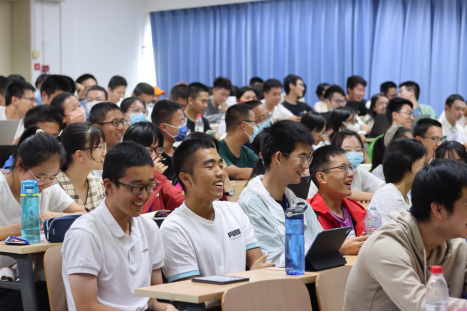
Students on the site
Three teams of Xinya College carried out labor-based study practice in Enshi Tujia and Miao Autonomous Prefecture of Hubei Province, Wuyuan County of Jiangxi Province, and Xinya Farm of Beijing respectively in the summer vacation.
A team led by Zhang Weite and Wu Bingyan, a student counselor, participated in the farming life in Tuanbao Town, Lichuan City, Enshi Prefecture. Every day, they learned weeding, harvesting crops, ploughing, and picking tea leaves. In addition, they read and discussed the classic book The Analects of Confucius. Away from the busy campus, they had a deep understanding of labor and reality. They were closer to the bright starry sky, the land in China, and the more real people.
A second team led by Zhang Yuanzhe and Yu Tianyu, a student counselor, experienced the connection and difference between farmers and workers in the fields and workshops of Wuyuan, Jiangxi Province. During that period, five reading discussions were organized. Li Zhen explained The Analects of Confucius online. The students were inspired in reading and practice.
A third team led by Zhang Yu adopted the group contract system at Xinya Farm of Beijing. The students contracted a piece of land to grow crops. They were responsible for the whole process of plowing, sowing, watering, weeding, fertilizing and picking. They trained themselves in the farming work in the suburbs, and made progress in skills and ideas through failure and joy.
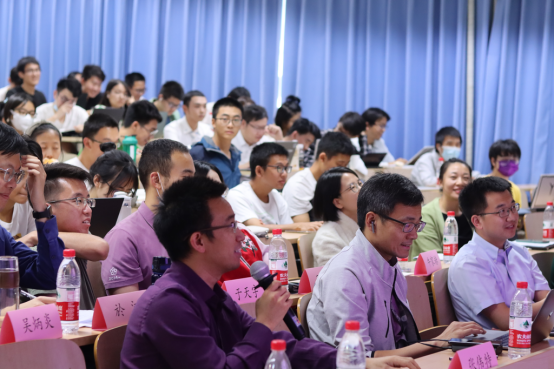
Zhang Weite makes a comment.
After the reply of the three teams in support of their own ideas, Zhang Weite, Zhang Yuanzhe and Zhang Yu, as leading teachers, introduced their feelings, experience and lessons. Li Zhen, as the reading instructor of The Analects of Confucius, shared related experience.
Subsequently, students from the three internship teams of Xinya College in Enshi, Xiong'an and Creative Design and Intelligent Engineering (CDIE) Creation Camp, and the Philosophy, Politics and Economics (PPE) fieldwork team made their presentations.
A team, led by Zhang Weite and Wang Shuyi, a student counselor, went to the government departments of Lichuan City, Enshi Prefecture, Hubei Province for internship. In the evening, exchanges and discussions were organized. They read the book Qunshu Zhiyao, or The Compilation of Books and Writings on Important Governing Principles to feel the political wisdom in ancient China. Based on their internship experience, students had a deep understanding of the government operation, local education, and improvement of people's wellbeing.
A second team led by Zhang Yuanzhe and Niu Jiahe, a student counselor, went to Xiong'an New Area. It was the first time that sophomores of Xinya College arrived at the national project of millennial significance. The students of the team tried their best to practice the advice of Mei Ciqi that "we should abandon presuppositions and bend down". Through mutual stimulation of reading and internship, they gained a deeper understanding. A student said that during the internship, the students had in-depth experience and reflection on the particularity of Xiong'an New Area's development and their own integration into unfamiliar groups.
With the instruction of Wang Mingming, students of the PPE fieldwork team explored the unique religious civilization of the ancient trading port in Quanzhou. Under the teacher's "free-range" arrangement and overall guidance, the students answered in their own way the question that how we can investigate a city in 10 days. In addition to the field research, they read recommended books and held on-site meetings for discussion. The summary of the team members provided experience for the next session of social practice.
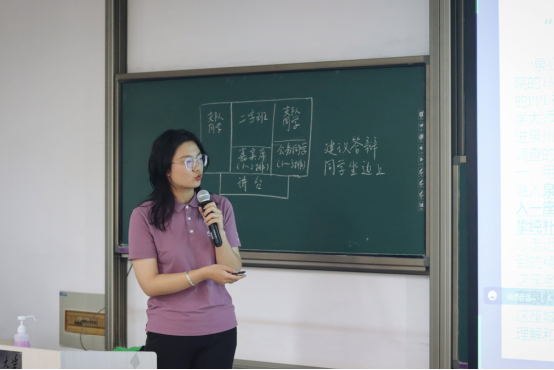
The PPE fieldwork team shares their experience.
The CDIE Materials Creation Camp team, led by Zhang Lei, participated in online research, offline courses, design and visit activities, together with students from the Department of Industrial Design, the Academy of Arts & Design, and felt the charm of modern creative design at an internship base in the Yangtze River Delta region. The team members inspired each other and made common progress in the rare opportunity, and had a more realistic and in-depth understanding of CDIE's concept of cultivating new-type designers.
At the end of the first half, Gan Yang commented online. He talked about his feelings for the characteristics of the labor-based study activities, and believed that manual work can help students understand the world beyond themselves, change their inertial pace of life, and not be restricted by the repetitive daily activities. Gan also said that the extracurricular exchanges among students and self-reflection make the labor-based study practice more meaningful. He hoped that the labor-based study plan of Xinya College will be fully developed so that students can truly understand the country and society.
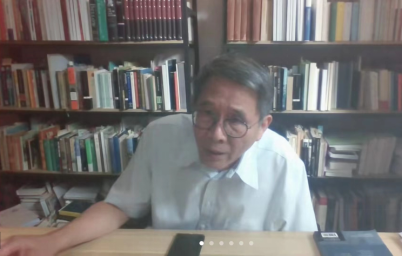
Gan Yang makes a comment.
The second half of the debriefing involved the following five practice teams with members who were free to team up.
The team to Xinjiang carefully made preparations. Despite the changing external factors, they finally designed a 320-hour curriculum of 14 courses on arts and science. In practice, the team members carried out activities such as voluntary teaching summer camp, home visit research and agricultural mechanization research in the CYLC Farm of which the General Secretary made an inspection tour, so as to deeply experience the great course of rural revitalization from the perspective of individual farmers. They completed the two-week practice with a lot of gains and touching moments.
The team jointly organized by Xinya College and the Student Association for Science Communication of Tsinghua University aimed to pursue the spirit of scientists as the guidance of youth in the new era and inherit the excellent quality and great spirit of senior scientists. The team members carried out online preparations to determine the interviewees and plan the process, and designed and conducted in-depth interviews around two questions, namely "what the spirit of scientists is" and "how we should do to foster the spirit of scientists". The team members were deeply moved by the senior scientists' view that young people should have aspirations and devote themselves to the fields that they are interested in and that are of significance to the country. They concluded that the spirit of scientists, a term with distinctive characteristics of the times and China, reflects the spiritual outlook and the outstanding contributions of the senior scientists in the development history of the People's Republic of China.
A team went to Ning'an and Hailin, two county-level cities in Mudanjiang City, to carry out research and creative practice. The team members summarized their practice as a household survey, a vivid rural story, a real benefit to the people, and a long-term working mechanism. They gained a deep understanding of the local industries' characteristics, and learned about the development status of the villages through CRCS questionnaires and interviews. The team members helped develop local industries through an original publicity form and creative cultural design. The students trained their professional ability and broadened their own horizons. In addition, they told a rural story and fostered love for the countryside.
The members of the innovation and entrepreneurship team focused on the four industrial directions of arts, science and aesthetics, traditional culture, electronic information, and intelligent manufacturing, and visited related enterprises and research institutions such as Contemporary Amperex Technology Co., Limited, NetDragon Websoft Holdings Limited, Chunlun Group and Cross-strait Tsinghua Research Institute. In terms of team building, they independently designed the profile of each member, and released six issues of posts to summarize the practical experience, thus enhancing the cohesion of the team. In practice, the members realized that business development cannot be achieved without policy support, and win-win results can only be secured through cooperation and mutual support. The beauty of modern industrial design is not limited to appearance, but more important is humanistic care: It should be designed for all, rather than a few people.
The last presenter was the team to Tibet under the Enjoying Reading Program of the Student Association of Educational Poverty Alleviation (SAEPA), Tsinghua University. The team members independently designed comprehensive practice activities such as voluntary teaching, extracurricular tutoring, book donation and research seminars. Throughout preliminary research, volunteer selection, teaching, field research and learning of the Party's history after returning to school, the team members overcame subjective and objective difficulties, stayed true to the original intention of "enjoying reading", achieved win-win results of self-growth and public-interest services, and made contributions to the connection between Tsinghua's public-interest cause and the sustainable development of the border areas.
After the presentation of all the internship and practice teams, Dean Mei Ciqi made a summary.
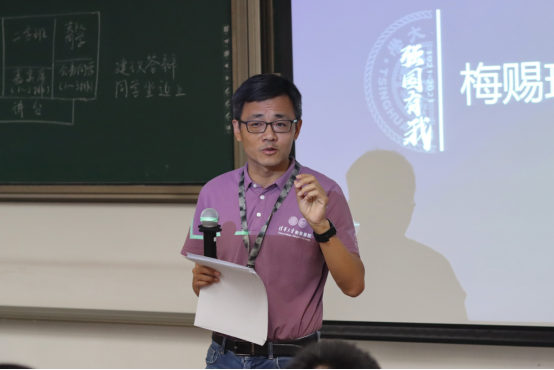
Dean Mei Ciqi makes a summary.
Mei spoke highly of the students' performance and the practical effect of the internship and practice teams in broadening their horizons and getting closer to the motherland, and put forward the following three suggestions. First, we should not be too romantic, but reflect on ourselves and the experience as objectively as possible. Second, we should have critical thinking, face up to the complexity of life and try to reveal the truth. Third, we should love strangers, miss the feelings of seeing different people and things in the real society, so as to keep in mind all people in the world who have really or even never been related to ourselves. He believed that is the fundamental goal of internship and practice.
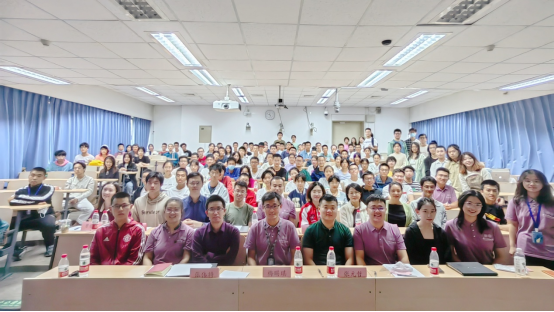
All teachers and students pose for a group photo.